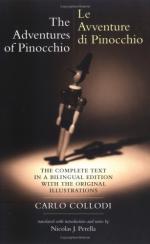As he got up from the ground amidst an outburst of applause, shouts and clapping of hands, he naturally raised his head and looked up, and he saw in one of the boxes a beautiful lady who wore round her neck a thick gold chain from which hung a medallion. On the medallion was painted the portrait of a puppet.
“That is my portrait! That lady is the Fairy!” said Pinocchio to himself, recognizing her immediately; and, overcome with delight, he tried to cry:
“Oh, my little Fairy! Oh, my little Fairy!”
But instead of these words a bray came from his throat, so sonorous and so prolonged that all the spectators laughed, and more especially all the children who were in the theater.
Then the director, to give him a lesson, and to make him understand that it is not good manners to bray before the public, gave him a blow on his nose with the handle of his whip.
The poor little donkey put his tongue out an inch and licked his nose for at least five minutes, thinking perhaps that it would ease the pain he felt.
But what was his despair when, looking up a second time, he saw that the box was empty and that the Fairy had disappeared!
He thought he was going to die; his eyes filled with tears and he began to weep. Nobody, however, noticed it, and least of all the director who, cracking his whip, shouted:
“Courage, Pinocchio! Now let the audience see how gracefully you can jump through the hoops.”
Pinocchio tried two or three times, but each time that he came in front of the hoop, instead of going through it, he found it easier to go under it. At last he made a leap and went through it, but his right leg unfortunately caught in the hoop, and that caused him to fall to the ground doubled up in a heap on the other side.
When he got up he was lame and it was only with great difficulty that he managed to return to the stable.
“Bring out Pinocchio! We want the little donkey! Bring out the little donkey!” shouted all the boys in the theater, touched and sorry for the sad accident.
But the little donkey was seen no more that evening.
The following morning the veterinary, that is, the doctor of animals, paid him a visit, and declared that he would remain lame for life.
The director then said to the stable-boy:
“What do you suppose I can do with a lame donkey? He would eat food without earning it. Take him to the market and sell him.”
When they reached the market a purchaser was found at once. He asked the stable-boy:
“How much do you want for that lame donkey?”
“Twenty dollars.”
“I will give you two dollars. Don’t suppose that I am buying him to make use of; I am buying him solely for his skin. I see that his skin is very hard and I intend to make a drum with it for the band of my village.”
Imagine poor Pinocchio’s feelings when he heard that he was destined to become a drum!




